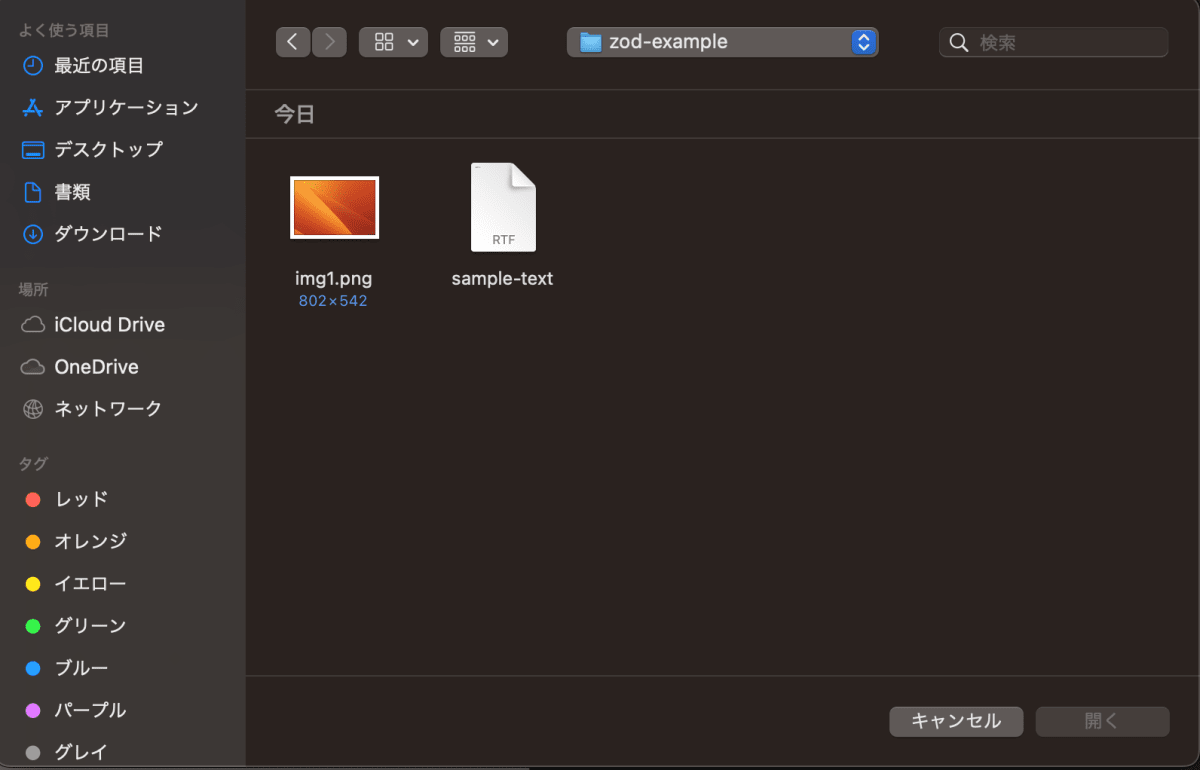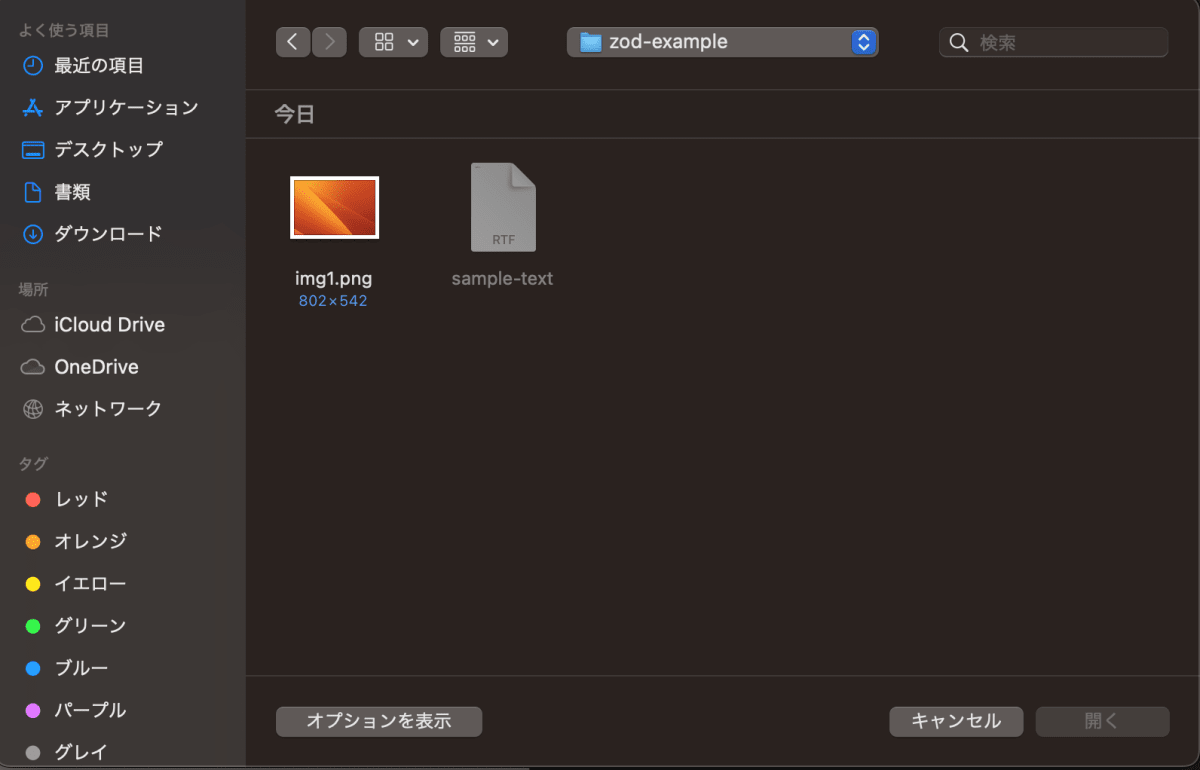Zodでファイル(画像)のバリデーションをする
結論
const IMAGE_TYPES = ['image/jpg', 'image/png'];
const MAX_IMAGE_SIZE = 5; // 5MB
// バイト単位のサイズをメガバイト単位に変換する
const sizeInMB = (sizeInBytes: number, decimalsNum = 2) => {
const result = sizeInBytes / (1024 * 1024);
return +result.toFixed(decimalsNum);
};
const schema = z.object({
file: z
// z.inferでSchemaを定義したときに型がつくようにするため
.custom<FileList>()
// 必須にしたい場合
.refine((file) => file.length !== 0, { message: '必須です' })
// このあとのrefine()で扱いやすくするために整形
.transform((file) => file[0])
// ファイルサイズを制限したい場合
.refine((file) => sizeInMB(file.size) <= MAX_IMAGE_SIZE, { message: 'ファイルサイズは最大5MBです' })
// 画像形式を制限したい場合
.refine((file) => IMAGE_TYPES.includes(file.type), {
message: '.jpgもしくは.pngのみ可能です',
}),
});
type Schema = z.infer<typeof schema>;
/*
type Schema = {
file: File;
}
*/
React Hook Formと組み合わせた例
import { useForm } from "react-hook-form";
import { zodResolver } from "@hookform/resolvers/zod";
import * as z from "zod";
const IMAGE_TYPES = ["image/png", "image/jpg"];
const MAX_IMAGE_SIZE = 5;
const sizeInMB = (sizeInBytes: number, decimalsNum = 2) => {
const result = sizeInBytes / (1024 * 1024);
return +result.toFixed(decimalsNum);
};
const schema = z.object({
image: z
.custom<FileList>()
.refine((file) => file.length !== 0, { message: "必須です" })
.transform((file) => file[0])
.refine((file) => sizeInMB(file.size) <= MAX_IMAGE_SIZE, {
message: "ファイルサイズは最大5MBです",
})
.refine((file) => IMAGE_TYPES.includes(file.type), {
message: ".jpgもしくは.pngのみ可能です",
}),
});
type Schema = z.infer<typeof schema>;
const SamplePage = () => {
const {
register,
handleSubmit,
formState: { errors },
} = useForm<Schema>({
resolver: zodResolver(schema),
});
return (
<form
onSubmit={handleSubmit((data) => console.log(data))}
className="p-[100px] bg-gray-400"
>
<input type="file" {...register("image")} accept="image/*" />
{errors.image?.message && <p>{errors.image?.message}</p>}
<br />
<input type="submit" />
</form>
);
};
export default SamplePage;
解説
z.custom<FileList>()
z.custom() を使う理由は明示的に型を指定したいのと、ぱっと見でどんな型かわかるようにしたいからです。
custom の型は以下のように定義されておりジェネリクスを受け取ります。
受け取ったジェネリクスは各メソッドの引数の型として使われています。
export declare const custom: <T>(check?: ((data: unknown) => any) | undefined, params?: Parameters<ZodTypeAny["refine"]>[1], fatal?: boolean | undefined) => ZodType<T, ZodTypeDef, T>;
export declare abstract class ZodType<Output = any, Def extends ZodTypeDef = ZodTypeDef, Input = Output> {
readonly _type: Output;
readonly _output: Output;
readonly _input: Input;
readonly _def: Def;
get description(): string | undefined;
abstract _parse(input: ParseInput): ParseReturnType<Output>;
_getType(input: ParseInput): string;
_getOrReturnCtx(input: ParseInput, ctx?: ParseContext | undefined): ParseContext;
_processInputParams(input: ParseInput): {
status: ParseStatus;
ctx: ParseContext;
};
_parseSync(input: ParseInput): SyncParseReturnType<Output>;
_parseAsync(input: ParseInput): AsyncParseReturnType<Output>;
parse(data: unknown, params?: Partial<ParseParams>): Output;
safeParse(data: unknown, params?: Partial<ParseParams>): SafeParseReturnType<Input, Output>;
parseAsync(data: unknown, params?: Partial<ParseParams>): Promise<Output>;
safeParseAsync(data: unknown, params?: Partial<ParseParams>): Promise<SafeParseReturnType<Input, Output>>;
/** Alias of safeParseAsync */
spa: (data: unknown, params?: Partial<ParseParams> | undefined) => Promise<SafeParseReturnType<Input, Output>>;
refine<RefinedOutput extends Output>(check: (arg: Output) => arg is RefinedOutput, message?: string | CustomErrorParams | ((arg: Output) => CustomErrorParams)): ZodEffects<this, RefinedOutput, Input>;
refine(check: (arg: Output) => unknown | Promise<unknown>, message?: string | CustomErrorParams | ((arg: Output) => CustomErrorParams)): ZodEffects<this, Output, Input>;
refinement<RefinedOutput extends Output>(check: (arg: Output) => arg is RefinedOutput, refinementData: IssueData | ((arg: Output, ctx: RefinementCtx) => IssueData)): ZodEffects<this, RefinedOutput, Input>;
refinement(check: (arg: Output) => boolean, refinementData: IssueData | ((arg: Output, ctx: RefinementCtx) => IssueData)): ZodEffects<this, Output, Input>;
_refinement(refinement: RefinementEffect<Output>["refinement"]): ZodEffects<this, Output, Input>;
superRefine<RefinedOutput extends Output>(refinement: (arg: Output, ctx: RefinementCtx) => arg is RefinedOutput): ZodEffects<this, RefinedOutput, Input>;
superRefine(refinement: (arg: Output, ctx: RefinementCtx) => void): ZodEffects<this, Output, Input>;
constructor(def: Def);
optional(): ZodOptional<this>;
nullable(): ZodNullable<this>;
nullish(): ZodOptional<ZodNullable<this>>;
array(): ZodArray<this>;
promise(): ZodPromise<this>;
or<T extends ZodTypeAny>(option: T): ZodUnion<[this, T]>;
and<T extends ZodTypeAny>(incoming: T): ZodIntersection<this, T>;
transform<NewOut>(transform: (arg: Output, ctx: RefinementCtx) => NewOut | Promise<NewOut>): ZodEffects<this, NewOut>;
default(def: util.noUndefined<Input>): ZodDefault<this>;
default(def: () => util.noUndefined<Input>): ZodDefault<this>;
brand<B extends string | number | symbol>(brand?: B): ZodBranded<this, B>;
catch(def: Output): ZodCatch<this>;
catch(def: () => Output): ZodCatch<this>;
describe(description: string): this;
pipe<T extends ZodTypeAny>(target: T): ZodPipeline<this, T>;
isOptional(): boolean;
isNullable(): boolean;
}
今回は画像を添付したかったのでFileListをジェネリクスに渡しました。
ちなみにz.any()でスキーマを作成することもできますが型はつきません。
const schema2 = z.object({
file: z.any().transform((file) => file[0]),
});
type Schema2 = z.infer<typeof schema>;
/*
type Schema2 = {
file?: any;
}
*/
引数で明示的に型をつけてあげることでanyを避けることができますが、このやり方だと後述する.refineでバリデーションを拡張する際、毎回引数に型を書く必要があるので面倒です。
const schema2 = z.object({
file: z.any().transform((file: FileList) => file[0]),
});
type Schema2 = z.infer<typeof schema>;
/*
type Schema2 = {
file: File;
}
*/
.transform((file) => file[0])
FileListの型を見てもらえればわかりますが、データを扱う時に毎回file[0]で取り出すのが面倒だったので.transformで変換しています。
.refine()
.refineを使うことで任意のバリデーションを設定できます。
条件がfalseの際にバリデーションが効いてメッセージを出力できます。
(補足)HTMLでも多少の制御はできる
例えばファイル選択を画像ファイルだけに制限したい場合、以下のようにaccept属性を指定することで、ユーザーのファイル選択を画像ファイルのみに絞らせることができます。
<input type="file" accept="image/*" />

accept属性を書いていない場合

accept="image/*"を記述している場合
accept 属性は、選択されたファイルの種別を検証するものではありません。これはブラウザーがユーザーに対して正しいファイル種別を選択できるようにするためのガイドをするためのヒントを提供するだけです。ユーザーがファイルセレクターのオプションを切り替え、これを上書きして任意のファイルを選択し、不正なファイル種別を選択することは (ほとんどの場合) 可能です。このため、期待される要件をサーバー側で検証するようにしてください。
ただ、MDNにも書いてあるようにフロント側でのバリデーションは補助的なものと捉え、あくまでサーバー側で検証をすることが必要です。
参考
Discussion
自分はこれまで、
とやっていたのですが、
customというのもあるんですね!自分もそれで行けるかと思ったですが以下のエラーが発生して動きませんでした。
melodyclueさんの環境だと問題なく動きますか?
自分はNextJSでやっていたのですが、その時に同じエラーが出ました!
その時は、これを実装しているコンポーネントを
dynamic import(ssr: falseで)することでエラーを回避できましたただ、customの方が楽ですね
なるほど!
その方法で回避できるんですね
ありがとうございます🙏🏻
すみません!もう一つ!
このcustomを使った時って、fileに格納するのは e.target.filesですか?
e.target.filesですね!
React Hook Formの場合はregisterにセットするとよしなにやってくれます
z.custom()は引数にバリデーション関数を渡さないと検証は行われません。つまり↓この場合、バリデーションは一切行われず、型をつけて変換するだけのzodスキーマになるので注意です。
コメントありがとうございます。
ご指摘いただいた内容について確認でき次第、記事を修正したいと思います。
日が空いてしまいすみません。
オクムラさんがおっしゃる通り、型をつけて変換しているだけのコードを「結論」として紹介しているのは不適切でした。
記事内容を加筆修正いたしましたので、よろしければお手すきの際にご確認ください!